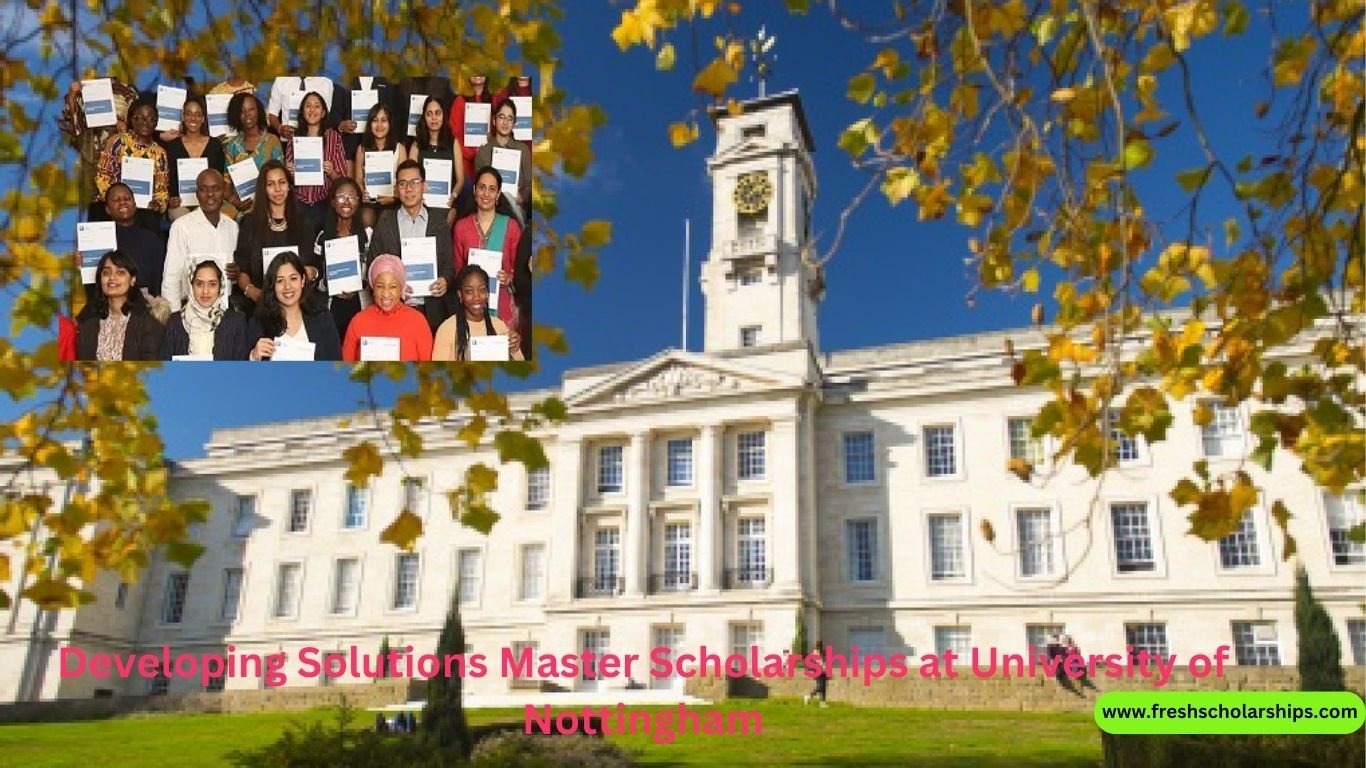 If you’re thinking about studying in the United Kingdom but worried about the cost, the Developing Solutions Master Scholarships at the University of Nottingham might be the chance you need. For many international students from Africa, South Asia, and other developing regions, this scholarship is not just financial support, it’s a real bridge to opportunities that otherwise feel out of reach.
If you’re thinking about studying in the United Kingdom but worried about the cost, the Developing Solutions Master Scholarships at the University of Nottingham might be the chance you need. For many international students from Africa, South Asia, and other developing regions, this scholarship is not just financial support, it’s a real bridge to opportunities that otherwise feel out of reach.
The program was created to help students who want to make a difference back home after their studies. Nottingham doesn’t just want students who will do well academically; it wants future leaders, innovators, and problem-solvers who will return and contribute to their communities. That’s what makes it special.
Let’s walk through everything you need to know, eligibility, benefits, application process, competition, and even some tips to make your application stand out.
What Are the Developing Solutions Master Scholarships?
This scholarship has been around since 2001. The University of Nottingham designed it specifically for international students coming from countries where resources for postgraduate study abroad are limited.
It’s focused on Master’s programs only. The scholarships are tied to areas that can impact social, economic, or environmental progress back home. Think about fields like health sciences, sustainable development, education, business innovation, or engineering, programs where graduates can directly make changes when they return.
So the goal is twofold:
Give talented students a chance to study in the UK without being crushed by costs.
Help developing regions grow by sending back graduates who have gained advanced knowledge and skills.
Who Can Apply for the Scholarship?
Not everyone can apply. The University sets very clear rules because this scholarship is designed for specific groups.
Eligible Countries and Regions
The scholarship is available to students from:
Africa (including countries like Nigeria, Kenya, Ghana, Uganda, South Africa, and many more)
South Asia (Pakistan, India, Bangladesh, Nepal, Sri Lanka, etc.)
Selected developing countries across Central and Latin America, the Middle East, and East Asia
If you are from a high-income country, unfortunately, you won’t qualify.
Academic and Admission Requirements
You must already hold (or be in the process of receiving) an offer for a full-time master’s program at the University of Nottingham, beginning in September.
Both conditional and unconditional offers are acceptable, as long as you meet them in time.
The scholarship is only for master’s programs. PhD or undergraduate applicants cannot apply.
Programs at Nottingham Trent University or other branches are not included, it’s strictly for the University of Nottingham UK campus.
Essentially, you must prove that you’re academically strong enough to be accepted first, and then you can apply for the funding.

Scholarship Coverage and Benefits
Now, the big question: how much funding do you actually get?
The Developing Solutions Master Scholarships offer two types of financial support:
The 50% Tuition Fee Scholarship
This is the most common form. It means that half of your tuition fees will be waived. For example, if your program costs £20,000, you would only pay £10,000.
For many students, this makes the difference between studying abroad and giving up.
The £7,000 Scholarship Option
Some students may be awarded a fixed amount, £7,000. This doesn’t always cover 50%, because tuition fees vary depending on the program. In some cases, it’s less than half; in others, it may be more.
For instance:
If your tuition is £14,000, then £7,000 is a 50% award.
If your tuition is £20,000, then £7,000 is around 35%.
Is It a Full Scholarship?
A few highly competitive awards may cover 100% of tuition fees, but they are rare. Most applicants should expect 50% or £7,000 support.
Still, this can be combined with personal savings, government grants, or other small bursaries, making study in the UK much more affordable.
Application Process for 2025 Entry
Applying is straightforward but requires planning.
Step 1: Apply for Admission First
You must apply for a master’s course and receive an offer. Without an admission offer, your scholarship application won’t be considered.
Step 2: Scholarship Application
Once you have your student ID and offer letter, you can log in to the University’s scholarship portal.
Step 3: Upload Your Documents
You’ll need:
Academic transcripts and certificates
Updated CV or résumé
Proof of admission offer
A strong personal statement outlining your goals
References (if available, though not always mandatory)
Step 4: Deadline Awareness
Deadlines usually fall around April or May for courses starting in September. Missing it means waiting another year.
Selection Criteria and Competition Level
Like all big scholarships, it’s competitive. Thousands apply every year, but only a small number are chosen.
Academic Excellence and GPA Requirements
While Nottingham doesn’t publicly announce a fixed GPA requirement, successful candidates usually have strong academic records. Think of a First Class degree in UK terms, or at least a 3.3/4.0 GPA equivalent.
Having publications, research projects, or leadership roles in student societies can strengthen your application.
The 12-Month Rule
Some students worry about the 12-month rule, which is common in UK government scholarships like Chevening and Erasmus Mundus. This rule says you can’t apply if you’ve already studied in the UK in the past year. Nottingham applies a similar principle: if you are already studying in the UK, your chances of eligibility reduce significantly.
Tips to Strengthen Your Application
Here’s where many students miss their chance, not because they’re not smart, but because they don’t present themselves well.
Writing a Strong Personal Statement
Your personal statement should answer three questions:
Why this program at Nottingham?
How will it help your home country?
What will you do after graduation?
Avoid clichés like “I want to study because education is important.” Instead, use real examples. For instance:
“Growing up in Lahore, I saw how limited access to clean water affected children’s health. By studying Environmental Engineering at Nottingham, I want to research low-cost water purification systems that I can later apply in Pakistan.”
That’s the type of passion and practicality reviewers want to see.
Highlighting Career Goals and Community Impact
Scholarships like this don’t just want students who will stay in the UK for work. They want graduates who will return home and lead change.
So explain how your degree connects to your country’s needs. Whether it’s healthcare shortages, renewable energy projects, or rural education systems, link your personal journey to national progress.
Why Choose the University of Nottingham?
Scholarships aside, Nottingham is one of the UK’s Russell Group universities, meaning it’s among the top research-led institutions.
It ranks highly in global university tables.
It has campuses not just in the UK, but also in Malaysia and China, giving you a global network.
Facilities are modern, with advanced labs, libraries, and student support centers.
The international student community is huge, making it easier to adapt.
Plus, living in Nottingham is more affordable compared to London, which is another hidden advantage.
Final Thoughts
For students in Pakistan, Africa, or South Asia, the Developing Solutions Master Scholarships are not just about studying abroad. They’re about coming back with knowledge that matters, knowledge that can help improve communities, economies, and lives.
If you’re serious about applying, start early. Prepare your personal statement carefully, get your documents ready, and connect your goals to real change in your home country.
This scholarship isn’t just financial aid, it’s a statement that the University of Nottingham believes in your potential to be a global problem-solver.

Scholarship and education policy analyst sharing updates on global study grants, government programs, and policy changes across Asia, Africa, and the Middle East.